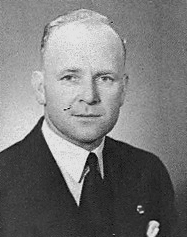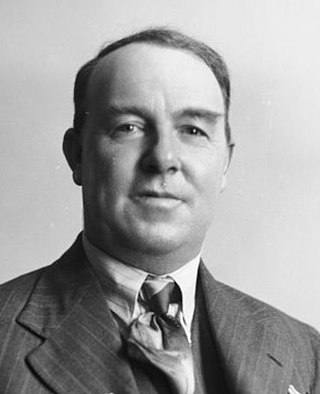
The 1935 New Zealand general election was a nationwide vote to determine the shape of the New Zealand Parliament's 25th term. It resulted in the Labour Party's first electoral victory, with Michael Joseph Savage becoming the first Labour Prime Minister after defeating the governing coalition, consisting of the United Party and the Reform Party, in a landslide.

The 1931 New Zealand general election was a nationwide vote to determine the shape of the New Zealand Parliament's 24th term. It resulted in the newly formed coalition between the United Party and the Reform Party remaining in office as the United–Reform Coalition Government, although the opposition Labour Party made some minor gains despite tallying more votes than any other single party.

The 1938 New Zealand general election was a nationwide vote to determine the shape of the New Zealand Parliament's 26th term. It resulted in the governing Labour Party being re-elected in a landslide, winning nearly 56% of the vote despite not gaining any more seats. Having replaced the United-Reform coalition, the newly founded National Party also gained a certain amount of ground.
The Democratic Labour Party (DLP) was a left-wing political party in New Zealand in the 1940s. It was a splinter from the larger Labour Party, and was led by the prominent socialist John A. Lee.

The 24th New Zealand Parliament was a term of the New Zealand Parliament. It opened on 23 February 1932, following the 1931 election. It was dissolved on 1 November 1935 in preparation for the 1935 election. The 24th Parliament was extended by one year because the 1935 election was held later than anticipated due to the ongoing depression, similarly the 1919, and the 1943 elections were held two years late, having been postponed during World War I and World War II respectively.

The 1928 New Zealand general election was held on 13 and 14 November in the Māori and European electorates, respectively, to elect 80 MPs to the 23rd session of the New Zealand Parliament.

Auckland Central is a New Zealand electoral division returning one member to the New Zealand House of Representatives. The electorate is currently represented by Chlöe Swarbrick, a member of the Green Party; she has represented the seat since 2020.

Bay of Plenty is a New Zealand electoral division returning one member to the New Zealand House of Representatives. The current representative is Tom Rutherford of the National Party, first elected at the 2023 election.

Rotorua is a New Zealand parliamentary electorate, returning one Member of Parliament to the New Zealand House of Representatives. It was first established in 1919, and has existed continuously since 1954. The current MP for Rotorua is Todd McClay of the National Party, who won the electorate in the 2008 general election from incumbent Labour MP Steve Chadwick.

Tauranga is a New Zealand parliamentary electorate, returning one Member of Parliament to the New Zealand House of Representatives. The current MP for Tauranga is Sam Uffindell of the National Party, who won the seat in the 2022 Tauranga by-election, following the resignation of the previous MP, Simon Bridges of the National Party.

Norman Vazey Douglas was a New Zealand trade unionist and left-wing politician. He joined the New Zealand Labour Party in 1932, but when John A. Lee was expelled from the party in 1940, Douglas followed to join the new Democratic Labour Party. He rejoined the Labour Party in 1952 and represented the Auckland Central electorate in Parliament from 1960 until his retirement in 1975, serving time on the Opposition front bench.

Axel Gordon Hultquist was a New Zealand politician of the Labour Party.

Sir William Sullivan, was a New Zealand politician of the National Party. A man of large stature, he was affectionately known as "Big Bill".
Avon is a former New Zealand parliamentary electorate. It was created for the 1861 general election and existed until 1996. It was represented by 13 Members of Parliament and was held by Independents, Liberal Party or Labour Party representatives.
Motueka is a former New Zealand parliamentary electorate. It was first created in 1860 and existed until the 1890 election, when it was abolished. For the 1896 election the Motueka electorate was recreated, and lasted until the 1946 election, when it was again abolished.
The 1947 Avon by-election was a by-election held during the 28th New Zealand Parliament in the Christchurch electorate of Avon. The by-election occurred following the death of MP Dan Sullivan and was won by John Mathison.

The Bay of Plenty by-election 1957 was a by-election held in the Bay of Plenty electorate in the Bay of Plenty during the term of the 31st New Zealand Parliament on 6 April 1957.
The Waitemata by-election was held on 19 July 1941 was caused by the death of Jack Lyon during the term of the 26th New Zealand Parliament. Mary Dreaver of the Labour Party won the by-election; she was the third woman elected to the House of Representatives.

Angela Maree Warren-Clark is a New Zealand politician and former Member of Parliament in the House of Representatives for the Labour Party.

The 1938 Christchurch City mayoral election was held on 11 May. The incumbent, John Beanland of the Citizens' Association, failed to get the nomination by his party and the surgeon Dr. John Guthrie was nominated instead. The Labour Party nominated Robert Macfarlane. Both the Labour and conservative candidate had been members of Christchurch City Council for some years. Macfarlane narrowly won the mayoralty.















